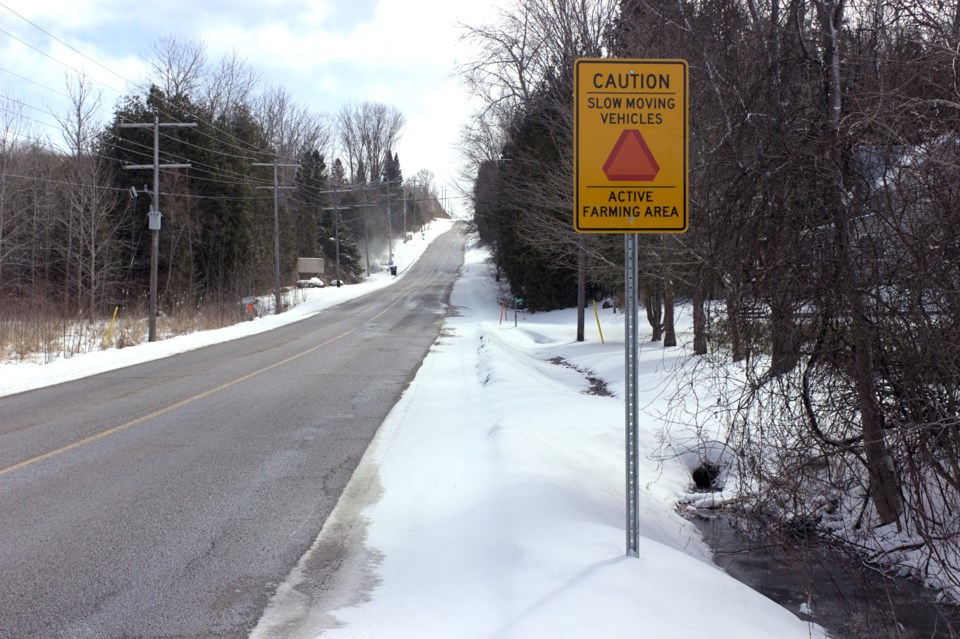Farmers from across Tay Township set their roots in council chambers this week to inform the municipality on the agricultural challenges they face, as well as to plant the seeds on ways to improve their situation.
Led by a 10-minute presentation by local farmer Steve Jones and supported by over 20 area farmers, the special meeting of council was keen to hear the topics of roads and equipment, field drainage, land use policy, along with the overall history of agricultural in Tay.
Jones cited both Stats Canada as well as Ontario’s agriculture census data from 2021 to provide a Tay-focused perspective on what was being farmed.
More than 75 farms exist in Tay, totalling 8,000 acres which range between 10 to 1,000 acres across the township.
Hay production is the top crop at 3,400 acres; soy beans yield 1,700 acres; corn for 1,300 acres; with the remainder from winter wheat, barley and oats, and other vegetation. Per livestock: 19 farms supply beef through 450 cows; dairy hosts 430 cows at nine farms; and there are 1,000 sheep at five farms.
“Gross farm receipts range per entity from under $10,000 per year to over $2 million per year; so there’s some pretty substantial businesses here as well,” said Jones. “Total farm receipts of $9 million in the township, so it’s not insignificant.”
Of those numbers, Jones added that: four farms make above $500,000 per year; under 15 farms make between $100,000 to $500,000 annually; and more than 50 farms earn under $100,000 per year.
Given the heavy production of agriculture in the township, Jones proceeded to explain the concerns faced with municipal services and infrastructure as it affected the community.
After showcasing the size of the farm equipment and machinery with some vehicles and their wagons reaching up to 75-foot lengths and being the width of some roads, Jones pointed out that the 80 km/h Rumney Road at both the intersections of Elliott Sideroad as well as Hogg Valley Road contain dangerous turning for large vehicles.
One example Jones used was a tractor at a full stop at such an intersection. “In that six seconds, we have to decide if it’s safe to move and engage the tractor – if they have a full load in the back they’re not fast to accelerate. By the time we get into the intersection and are travelling down the road, those cars are right on us.
“It scares me a lot of times when we’re running machinery and we can’t see properly,” Jones added. “To my knowledge we haven’t had any incidents in the township, which is great; I don’t want to be the first one.”
Other issues faced by farmers included low overhang from trees that have damaged expensive equipment mounted to the tops of their vehicles; inadequate drainage from certain ditches in the township causing water to overflow onto field areas, resulting in poor or nil crop yields for those spots.
Tay's general manager of operational services, Shawn Berriault, updated the attendees that intent from last year to re-ditch problematic areas were postponed, and would be addressed this year.
As well, the loss of farmland as the province expands its urban sprawl was a concern, with Jones citing an instance where Tay Township declined a temporary land use application on farmland for the Southwest Fire Academy, despite the property not being actively farmed for decades.
For solutions, Jones offered that a Tay agricultural advisory committee be established which would include farmers along with municipal councillors and staff. Also requested was for the township to work at keeping ditches and culverts clear of debris for better drainage.
Members of council expressed appreciation for the presentation and turnout, with a few admitting they had learned things about the agriculture in their municipality from the group.
Both Mayor Ted Walker and Coun. George LaChapelle showed interest in establishing the agriculture committee, and Coun. Paul Raymond pitched the possibility of agri-tourism with neighbouring Tiny Township, following a conversation he’d had with a council member of that municipality.
Within the audience, resident Joel Rumney added that 70 per cent of soy beans grown in Ontario are distributed worldwide, including Tay’s 1,700 acre contribution. Simcoe County Federation of Agriculture president Dave Ritchie, also a Tay resident, encouraged council and members of the public to attend a field day event in Innisfil on April 19 for a hands-on experience with farming and equipment.
Following the meeting, Coun. Raymond told MidlandToday that since becoming a Tay councillor in 2018, “I learned more about our agri-community today than I have ever known.
“I hope that this is the first step in actually improving the knowledge base for our community,” Raymond added. “A lot of people are moving here from the city; they have no idea that we have such a big agri-community, and it’s important to us.”
When Jones was asked by MidlandToday about misconceptions toward the farming community, its crops and its process, he replied: “It would be nice if people had a broader education about agriculture since we all eat food; it would be nice if they knew what we use and how we farm, and the reasons for that. They’re for good reasons.
“We try to optimize what we do to be environmentally sustainable, but also be profitable because we are a business, too. We try to wrap all that together,” said Jones.
He suggested that residents interested in learning more about farming, techniques, resources and further information can visit the Farm & Food Care Ontario website, hosted by a provincial coalition of farmers and associated businesses.
The presentation on agricultural and rural concerns, including the slideshow with photos and statistics, can be found in the agenda page on the Tay Township website.
Tay council meets for committee of the whole meetings every second Wednesday of the month, and regular council meetings every fourth Wednesday of the month. Archives and livestreams of council meetings are available through the Tay Township YouTube channel.


